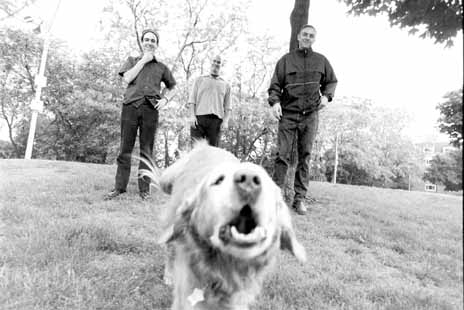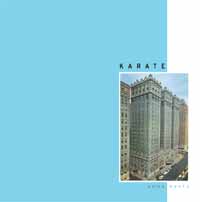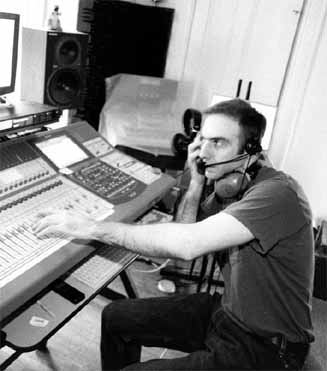|

Karate:
Sweep the Leg, Geoff
story by tim mcmahan
|
|
|
Lazy-i: October 10, 2002
|
Karate
w/Neva Dinova, The Mariannes
Wednesday, Oct. 16
9 p.m.
Sokol Underground
13th & Martha
Omaha
|
|
|
The calculated
groove of Karate's music is insidious in its simplicity. Don't be
deceived. This is no mere soul-jam, no stumbling revelation, no
product of blind improvisation.
As free-form
and flowing as it may seem, Karate's music is the product of monumental
precision.
"In
a sense, it is exacting," said Karate guitarist and singer
Geoff Farina by phone from drummer Jeff Goddard's Boston home on
the eve of a national tour that brings the trio to Omaha's Sokol
Underground Oct. 16 (drummer Gavin McCarthy rounds out the band).
Farina said he began
writing the nine songs on the band's latest Southern Records full-length,
Some Boots, two years ago. "We learn four songs, play
them a couple months, then go on tour for a couple months, then
learn four more. It normally takes about a year to pull it together.
We toured on every song, using the performances to decide what sounded
good."
|
|
|
It
doesn't stop there. Farina says the songs' dense harmonies demand
that he meticulously write out charts to share with his cohorts.
"That way, we can make it happen right there during practice
without having to go over it and over it," he said. "Jeff
likes to have it laid out in front of him, while Gavin is more of
an 'ear' person. By writing out the songs, we can bridge the gap
between us more quickly and not have to articulate things via conversations.
"We'd like to jam
more than we do," he added, "but it's in the nature of
the music -- we're very structured in a lot of ways."
If Farina sounds almost
academic in his descriptions, it's probably because he and the rest
of Karate are products of the famed Berklee College of Music (in
fact, Farina has an MA from the University of Massachusetts, where
he wrote a thesis called "Humans and Hardware: a History
of Analog Music Synthesis").
Karate's songs even sound
more intelligent than their indie-rock brethren -- a rather snooty
bunch to begin with. Each well-thought-out composition is like a
perfectly sculpted gem. Take "Airport," for example, with
its tightly cut rhythms, glittering jazz-tone guitars, and faceted,
scatty vocals that combine in a Pretzel Logic-era Steely
Dan sort of way (Farina's vocals even resemble those of an edgy,
pouty Donald Fagin).
Ah, but amidst those
well-groomed musical hedges is all that unbridled ivy -- the guitar
solos. We're not talking solos like those behind-the-back, tongue-wagging
axe-slingings of your favorite '80s hair band -- more like intricate
jazz outings that slowly boil over with buzz and howl, releasing
all the unrestrained tension. Farina says the solos are where the
band stretches its improvisational muscle, and he relishes every
moment of it. "All the guitar solos are improvised," he
said. "When we recorded, I did five guitar solos for each song.
It's a big part of what we do, but they're also structured -- we
know exactly where to start and stop."
With all that rehearsed
precision, you'd think their time in the studio would be a walk
in the park. Think again. "When everything's going right, it's
still not a quick process," Farina said. "You're talking
15 days and nights to mix and do overdubs. It's one reason why we
have things so worked-out before we enter the studio -- if we didn't,
we'd be in there for months."
|

|
"You're
talking 15 days and nights to mix and do overdubs. It's one
reason why we have things so worked-out before we enter the
studio -- if we didn't, we'd be in there for months"
|
|
|
|

|
"I
consider myself to be a citizen, a white boy from the suburbs.
I want to deal with everyday issues, but I don't want to preach"
|
|
|
Instead,
the band will be spending months on the road crossing the country
supporting Some Boots. It's a fate that Farina, a road veteran
since '94, doesn't relish. "As we get older and get more commitments,
it gets harder being on the road," he said. "Karate could
never be just a studio project. I don't think we want to hide away
from people. Our live set sort of defines us. Half of what we do
is make music in the studio, the other half is playing it live on
stage."
Farina would rather be
home rebuilding an amp in his Naragansett, Rhode Island, grange
hall he and fellow musician/artist Jodi Buonanno renovated into
a studio and art space, surrounded by the artists, writers and filmmakers
that make up his life. "A lot of my inspiration comes from
the creative community we surround ourselves with," he said,
adding that his rustic home is a necessary escape from the hustle-bustle
of Boston, just 90 minutes away where he lived for 13 years.
"I surf all summer
and get to enjoy the foliage," he said. "I don't know
if it directly influences the music, but there's a calmness and
serenity there."
Another influence, though
subtle, is politics, which Farina says he deals with abstractly
in his lyrics. "I've never lived in less of a democracy in
my life," he said, reflecting on the current state of national
affairs. "What used to be a dialogue has turned into a monologue.
I don't how to separate politics from my music."
Still, you won't find
any fist-pumping anthems on Some Boots. Perhaps the most
direct lines come on "Ice or Ground?," a dialogue between
two long-time political activists over the then-ensuring war in
Afghanistan: "Complaining's not gonna change things now
/ Let's get one thing straight: no one did nothing for your freedom."
"I consider myself
to be a citizen, a white boy from the suburbs. I want to deal with
everyday issues, but I don't want to preach," Farina said.
"I grew up with
punk rockers who get up there and scream idealism. It hasn't helped
me. I think the idea is to get people to think for themselves. Right
now, there's a lack of information, a huge vacuum in a lot of ways.
People need to question and talk to each other, not force their
point of view -- that's not helpful."
Back to 
Published in The Omaha Weekly Oct. 9, 2002. Copyright © 2002 Tim
McMahan. All rights reserved.
|
|
| |
|
|
|
